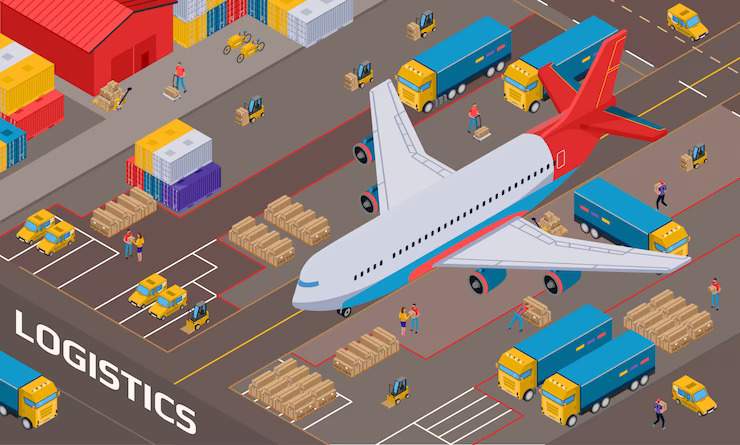
AWB History And How Integrated E-AWB Has Been A Game-Changer
Air Waybill (AWB) is a document used in air cargo transport that serves as a contract of carriage between the shipper and the carrier. It contains information about the shipper, the consignee, the destination, the goods being shipped, and the terms of carriage. AWBs have been in use since the 1930s and have played a crucial role in the air cargo industry.
However, the traditional paper-based AWB system has been a major pain point in the air cargo industry due to its inefficiency and potential for errors. The introduction of the Integrated Electronic Air Waybill (e-AWB) system has been a game-changer for the industry. The e-AWB system enables the electronic creation, storage, and transmission of air waybills, eliminating the need for paper-based documentation.
Advantages of eAWB
The eAWB (electronic Air Waybill) is a digital version of the traditional paper Air Waybill used in air cargo transport. Here are some of the key advantages of using eAWB:
- Improved Efficiency: The eAWB system eliminates the need for paper-based documentation, reducing the time and resources required to process air waybills. This has resulted in faster and more efficient cargo processing and reduced lead times.
- Cost Savings: The eAWB system eliminates the need for printing and handling paper documents, reducing associated costs. This has resulted in significant cost savings for carriers and shippers.
- Enhanced Accuracy: The eAWB system reduces the risk of errors and omissions associated with paper-based documentation. This results in increased accuracy and reduced risk of delays and fines due to incorrect or missing information.
- Improved Visibility: The eAWB system enables real-time tracking and visibility of cargo, providing shippers and carriers with up-to-date information on the status of their shipments. This has improved transparency and reduced the risk of lost or delayed cargo.
- Enhanced Security: The eAWB system provides a secure and tamper-proof digital record of cargo, reducing the risk of fraud and theft.
- Improved Environmental Sustainability: The eAWB system eliminates the need for paper-based documentation, reducing paper waste and its associated environmental impact.
- Compliance: The eAWB system is compliant with global trade regulations and industry standards, making it easier for businesses to comply with regulations and avoid fines and penalties.
How air waybills work and why they’re important?
An air waybill (AWB) is a document that serves as a contract of carriage between a shipper and an air carrier for the transportation of goods. It is issued by the carrier or its authorized agent and includes information about the shipper, consignee, the goods being shipped, the destination, and the terms of carriage. Air waybills are a critical component of the air cargo industry and are used for tracking and documentation purposes.
Here’s how air waybills work:
- Issuance: The air waybill is issued by the carrier or its authorized agent at the origin of the shipment.
- Acceptance: The shipper or its authorized agent accepts the air waybill and provides information about the shipment, including the type of goods being shipped, the weight, and the dimensions.
- Transportation: The carrier transports the shipment to the destination, following the terms of the contract of carriage specified in the air waybill.
- Delivery: The consignee receives the shipment at the destination, and the air waybill is used to confirm the delivery and the transfer of ownership of the goods.
Here are some reasons why air waybills are important:
- Legal Document: The air waybill serves as a legal document that outlines the terms and conditions of the contract of carriage between the shipper and the carrier.
- Proof of Shipment: The air waybill provides proof that the shipment has been accepted by the carrier and is in transit.
- Tracking: The air waybill is used for tracking the shipment, enabling the shipper, consignee, and carrier to monitor the shipment’s progress and location.
- Customs Clearance: The air waybill is required for customs clearance, providing the necessary documentation for the shipment to enter or exit a country.
- Payment: The air waybill is used to calculate the transportation charges and to bill the shipper or consignee for the services provided by the carrier.
How eAWB will benefit the air freight forwarders
The adoption of eAWB offers several benefits to air freight forwarders, including:
- Faster Processing: eAWB allows for faster processing of air waybills as it eliminates the need for manual data entry and physical document handling, reducing processing times.
- Increased Accuracy: eAWB reduces the risk of errors and omissions associated with manual data entry, resulting in increased accuracy and reduced risk of fines and delays due to incorrect or missing information.
- Cost Savings: eAWB eliminates the need for printing and handling paper documents, reducing associated costs. This has resulted in significant cost savings for air freight forwarders.
- Improved Efficiency: eAWB provides real-time tracking and visibility of cargo, reducing the need for manual tracking and communication between different parties involved in the shipment.
- Improved Customer Service: eAWB allows air freight forwarders to provide improved customer service by providing real-time tracking and visibility of cargo, enabling timely updates to customers.
- Reduced Environmental Impact: eAWB eliminates the need for paper-based documentation, reducing paper waste and its associated environmental impact.
- Compliance: eAWB is compliant with global trade regulations and industry standards, making it easier for air freight forwarders to comply with regulations and avoid fines and penalties.
conclusion
eAWB offers several benefits to air freight forwarders, including faster processing, increased accuracy, cost savings, improved efficiency, improved customer service, reduced environmental impact, and compliance with global trade regulations and industry standards. These benefits enable air freight forwarders to provide improved services to their customers while also reducing costs and improving their environmental sustainability.















